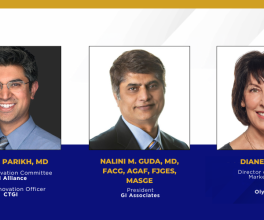
Infection Prevention in Endoscopy: ‘If Everything’s Going Right, You Don’t Notice It’
This podcast has been paid for by Olympus Corporation of the Americas. The views and experiences shared are those of Linda Dickey, a paid consultant of Olympus and its affiliates. Olympus makes no representations regarding the accuracy or applicability of the content and disclaims all liability arising from its use. Always refer to the Instructions for Use and applicable labeling for guidance, risks, and cautions.
Summary: Olympus’ Infection Prevention and Control (IPC) Specialist Jamie McGloin, and IPC consultant Linda Dickey discuss the role of an infection preventionist (IP) in endoscopy from multiple perspectives. Responsibilities can encompass keeping up with professional society guidelines, jurisdictional regulations, and manufacturers’ instructions for use (IFU), all while appreciating the unique workflow challenges that reprocessing technicians face in the endoscope reprocessing cycle.
Imagine supporting professionals and departments in a high demand, fast-paced setting that is underrecognized and often unnoticed? That’s how Linda Dickey, RN, MPH, CIC, CPHQ, FAPIC, describes her 30+ years of experience in infection prevention to outsiders. “It’s sort of like your HVAC system” quietly running and maintaining an optimal room temperature. “It’s not that people don’t value infection prevention, but it’s not really noticed until there’s really a problem.” Dickey, former APIC president and hospital based infection preventionist turned consultant, was a guest on DeviceTalks’ OlympusTalks podcast, along with Jamie McGloin, CIC, CFER, IPC specialist for Olympus, who shares how her career launched in the midst of the COVID-19 pandemic, and how she’s applying her hospital IPC experience to industry.
Infection Prevention in the Time of COVID
McGloin interned with a hospital IPC department for over a year before she took the role of a hospital IP. “It was a steep learning curve,” she admits. COVID-19 only magnified the outsider disconnect Dickey alluded to with IP. During the pandemic, “There was a lot of cognitive dissonance between what we were experiencing in the hospital versus what was happening out in public,” said McGloin. She recalls “going to work on a Monday…still masking, but that Saturday you were at a concert.” Once the pandemic waters receded, challenges shifted from emergency response to “trying to play catch up … going 100 miles an hour.”
Fast forward to McGloin’s role at Olympus and how she is a voice for IPs ‘on the inside.’
Who is the authority on this?
Keeping up with standards and protocols is no easy task. “There are a lot of voices out there,” acknowledged Dickey. Part of an IP’s job is “looking to the ones that we know and trust,” but also understanding who has jurisdiction based on the healthcare setting, she explained. This includes local, state, and federal regulatory requirements, in addition to “trusted sources like the CDC … professional societies, and associations.” Of course, “it’s not uncommon for us to really dig into the details of these types of [guidance] documents and talk to our peers, talk to other organizations across the country and [ask], ‘How are you handling this? How are you interpreting this? What’s your policy around this?’” Dickey added.
“A lot of these guidelines and standards have the same skeleton, but the meat on the bones show up in different forms,” McGloin adds. And some are more robust than others, she observed.
What is on Dickey’s list of improvements in the field of infection prevention?
‘Space, time, and staff’ pain points
McGloin and Dickey both shine a light on challenges faced by reprocessing technicians on the front lines of infection prevention. McGloin said three overarching issues include “space, time, and staff.”
I just need space. In reprocessing, “there’s a lot of steps involved, and people are in personal protective equipment (PPE), they’re at the sinks, they have to have very focused attention on these things,” said McGloin. “Sometimes our techs are shoved into these tiny little spaces with not necessarily enough sink space.”
The clock is ticking. From a time perspective, the clock starts ticking on the clinician’s watch, McGloin adds. “Reprocessing starts at the point of use, so that precleaning needs to happen as soon as the procedure is over, and that means the device is still in the hands of that clinician,” she said.
Workload can be unpredictable, but on the busy days, Dickey likens it to the classic “Lucy and Ethel in the Chocolate Factory” episode of the 1950’s I Love Lucy show, where the volume of candy on the conveyer belt proves unmanageable for the duo. “[Providers] don’t often understand the pain points and the pressures,” added Dickey. Techs may be up against a “How hard could it be?” sentiment when clinicians have 30 cases scheduled for the day, she offered.
Retention issues. Because of these pressures, staff retention can be an issue. “How do we get folks interested in careers in reprocessing, willing to be in PPE all day, working at the [decontamination] sinks?” McGloin questions. “How do we support them with continuing education and appropriate resources and make it a career that people are willing to stick [with] and build expertise in?”
The IP wish list
McGloin also stressed the need for IPs and techs to have access to the latest manufacturers’ instructions for use (IFUs) of the devices they reprocess. IFUs outline specific requirements on cleaning, disinfection, and/or sterilization. Dickey stressed that in the facility, the IP “can be a sort of a wingman or a second pair of eyes” for reprocessing staff and evaluate where there may be gaps in what’s being advised and what’s being done. “IPs can also help navigate through IFUs that are unclear or difficult to follow.”
In terms of tracking infections related to endoscopic procedures, Dickey would like to see standardization. “I find it fascinating that we don’t have a standardized definition for endoscopic related infections,” in the same way that we do for other healthcare-associated infections, she observed. McGloin agrees that this puts IPs at a disadvantage from a surveillance perspective.
The good news is that McGloin sees herself as a kind of insider working for a medical device manufacturer, vowing to champion for infection prevention professionals in her role. “Don’t worry guys,” she seemed to be saying to her underrecognized colleagues. “I’m speaking up.”





